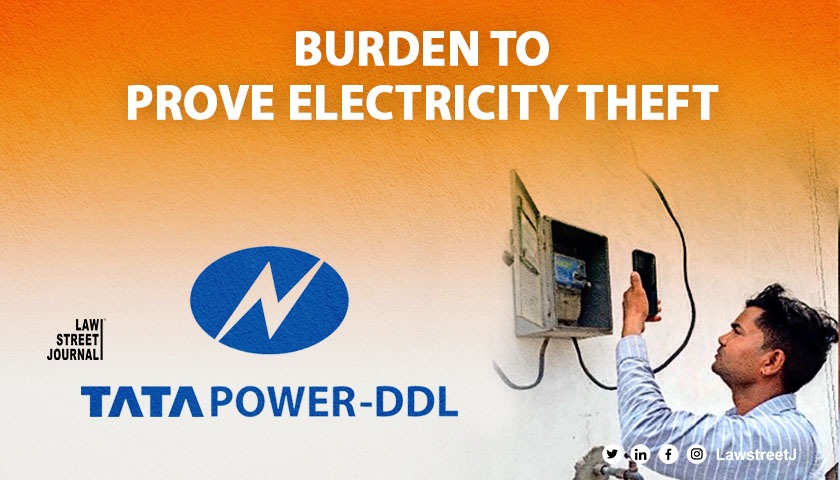NEW DELHI: The Delhi High Court has held that the burden to prove that a person has dishonestly damaged or destroyed an electric meter to commit electricity theft is on the prosecution under the Electricity Act, 2003 (the Act) and that Section 105 of the Indian Evidence Act, 1872 cannot be used to shift this burden.
The Court was hearing Tata Power Delhi Distribution Ltd (Tata Power) in an appeal against a trial court order which acquitted the accused of charges under Sections 135 (theft of electricity), 138 (interference with meters or works of licensee), 150 (abetment) of the Act.
Tata Power had raised a theft bill against the accused demanding around Rs. 33 lakhs against the accused which was revised to approximately Rs. 26 lakhs during the proceedings before the Delhi Electricity Regulatory Commission (DERC).
However, ruling against Tata Power, a single judge bench of Justice Navin Chawla held, The onus of proof of the same shall always lie on the prosecution and such onus must be discharged on the touchstone of beyond reasonable doubt. The prosecution cannot shift this onus on the accused. It is not for the accused to prove his innocence.
Importantly, the Court also rejected Tata Powers reliance on Sections 105 (burden of proving that case of accused comes within exceptions) and 106 (burden of proving fact especially within knowledge) of the Indian Evidence Act, 1872 seeking to shift the burden of proof on the accused.
The Court held that Section 105 does not apply for cases under Sections 135, 138 or 140 of the Electricity Act, as there are no exceptions in these sections at all.
Regarding Section 106 of the Indian Evidence Act, the Court cited the Supreme Courts decision in Satye Singh & Anr. v. State of Uttarakhand, (2022) 5 SCC 438, and held that this provision is not to relieve the prosecution of its duty to prove the case against the accused.
Therefore, the bench reasoned that in the present case, it was for the petitioner to prove that the meter had been dishonestly burnt by the respondent (accused). The petitioner, having failed to prove the same, cannot shift this burden on the respondent by placing reliance on Section 106 of the IE Act.
Thus, the Court dismissed Tata Powers petition for leave to appeal.
Facts
The brief facts were that Tata Power supplied electricity to the accused. Upon inspection of the electric meter by the companys officials the subject meter, the body of the meter box, and the resin cast CT, were found completely burnt.
To rule out any malpractices, the meter was sent for forensic testing to M/s Truth Lab - which specializes in such forensic services and is endorsed by the EQDC.
According to the reports, the consumption pattern of the subject meter was analysed, and the average recorded consumption was found to be 33.90% of the average computed consumption.
On this basis, Tata Power charged the accused with electricity theft and filed relevant court proceedings. However, the Trial Court acquitted the accused finding M/s Truth Labs report to be lacking on a scientific basis.
Arguments
The prosecution relied on the Truth Labs report and conclusion regarding the computed consumption to allege electricity theft, and further argued that the burden of proof regarding their specific defence that the meter had burnt due to a short circuit was on the accused.
The defence, on the other hand, assailed the reliance on the lab report by arguing that the reports author was not an expert in electrical engineering but only in chemical forensics - therefore not an expert under Section 45 of the Indian Evidence Act.
No tests had been carried out to conclude that the meter in question was mounted on a wooden block, further, the author had concluded that the meter was burnt solely on the ground that wires were found charred.
The defence argued that there is no scientific basis to the conclusion that the wires were charred due to burning and not due to a short circuit or internal defect in the meter.
Courts conclusion
Regarding the average recorded consumption being lower than the computed one, the Court held that this would at best raise a doubt against the respondent; it cannot act as a proof beyond reasonable doubt to hold that the respondent has dishonestly tampered with the meter.
The Court also agreed with the defence and noted that the lab reports author had admitted that there is no scientific test through which she could conclude about the real cause of the burning of the meter in question.
In fact it said that the statement of the said witness creates more doubts than answers of the same, and ruled in favour of the accused.
Cause Title: Tata Power Delhi Distribution Ltd v Amit Bansal







![Delhi High Court Sets Aside Arbitral Tribunal's Award Against NHAI in Highway Project Delay Case [Read Judgment]](/secure/uploads/2023/07/lj_9605_23374c2e-392c-4491-a2fe-f2f12fc5272f.jpg)
![Delhi Court Rejects Stay Request in Defamation Case Against Rajasthan CM Ashok Gehlot [Read Order]](/secure/uploads/2023/08/lj_5208_80de1ddc-d76a-4f7f-b180-408e3ae14fb4.jpg)







